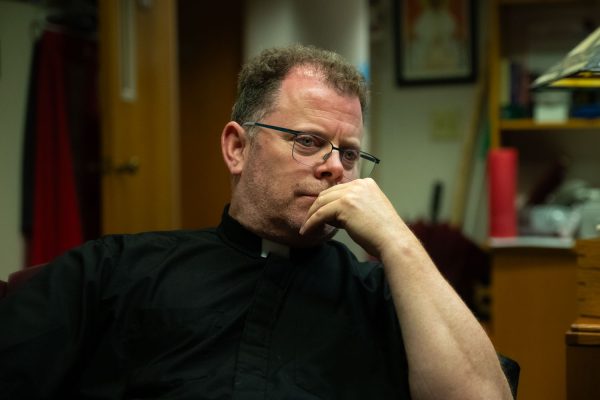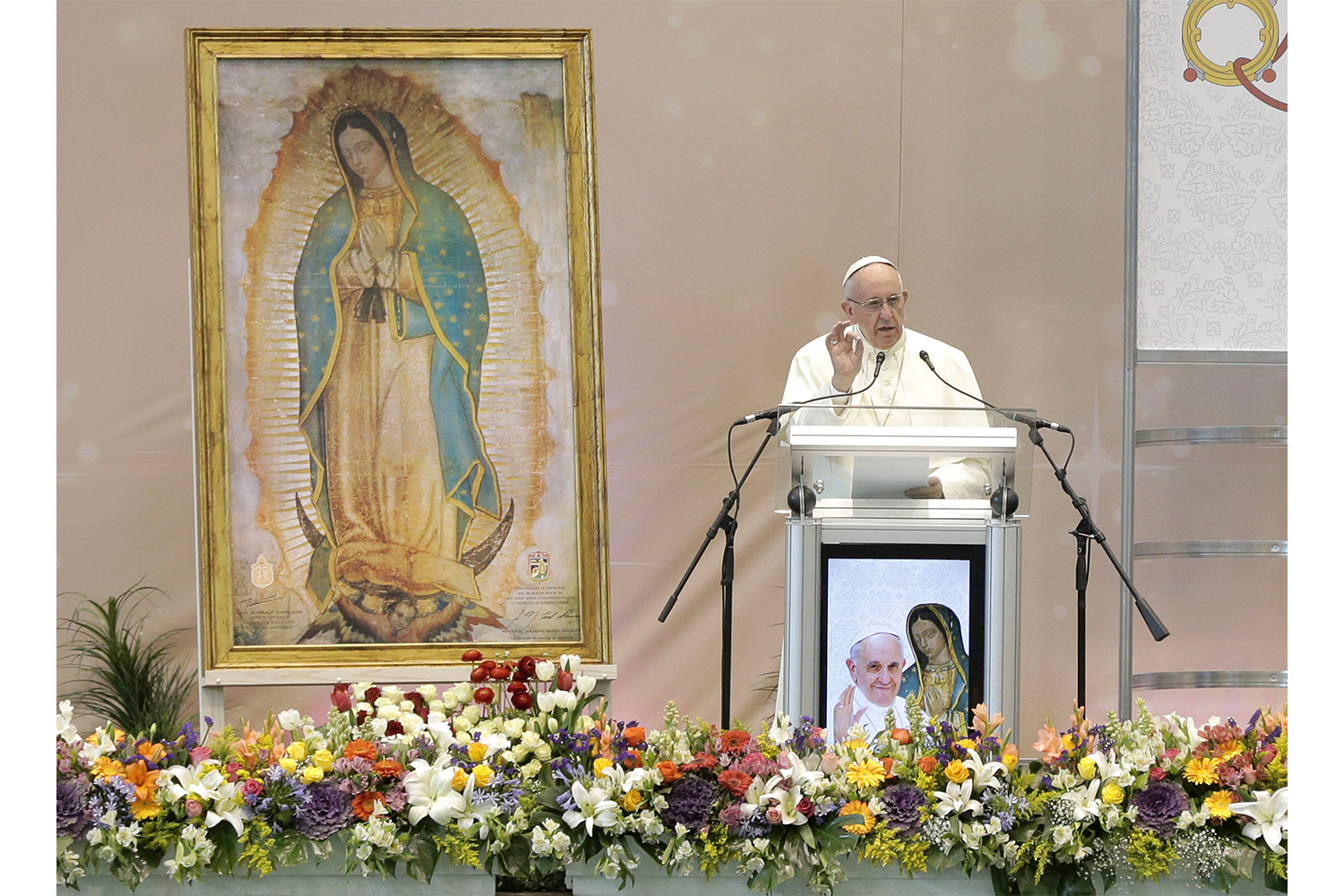Iowa City Catholics are divided on who they will vote for in the presidential election after Pope Francis told U.S. Catholics to vote for “the lesser of two evils.” He condemned both presidential candidates for being against life due to their stances on abortion and immigration.
The pope did not specify which candidate he preferred but rather emphasized that both former President Donald Trump and Vice President Kamala Harris do not uphold Catholic values.
“Both are anti-life. Both the one who throws out migrants and the one who kills babies. Both of them are against life,” Pope Francis said.
Pope Francis’s comments referred to Harris’s pro-choice platform on abortion and Trump’s stance on migration and border control. The pope did not say which of these policies was more problematic and said the decision would lie in the hands of the American people. He also urged every American to exercise their right to vote.
Christians are by far the largest religious group in Iowa, making up 77 percent of the state’s religious population. Within this group, Catholics make up 18 percent. A historically unpredictable voting bloc, Catholics are evenly divided between Democrats and Republicans and have swung between the two parties during recent elections.
Given the split, Catholics are an unknown quantity in this upcoming election. Yet, Pope Francis wants them to vote.
Iowa City Catholics, too, are divided on the issue. Reporting from The Daily Iowan suggests many who attend local parishes are still undecided in light of the pope’s guidance.

Rev. Jeff Belger, the priest director of the Newman Center at the University of Iowa, described Pope Francis’s remarks as blunt but truthful.
Belger said the comments reflect the values of the church but also said that when making a moral decision, one must understand that some things are intrinsically evil while others are more nuanced, and their morality can be debated.
“His comment was, I think, oversimplified, by just saying they are both anti-life,” Belger said.
Belger also said he is frustrated at the lack of pastoral direction these comments provided. While emphasizing that the Catholic church is very pro-immigrant, he said that the U.S. bishops have already expressed that the abortion issue should take priority.
“It’s frustrating that he said it in that context, because the bishops of the United States have made a clear statement that the abortion issue is the pre-eminent issue of dealing with evil in our country,” Belger said.
Belger said he doesn’t affiliate with either party but rather votes based on issues that he sees as holding the greatest importance, which, for him, is abortion.
Belger acknowledges that no candidate is perfect. So, when he tries to come to a decision based on policy, Belger said he must assess issues where compromise can be found. Belger said compromise is possible on issues that are more subjective, such as the best approaches to handling immigration, but compromise is not possible on moral issues like abortion. These moral issues, Belger said, should guide voters in their decisions.
“I feel confident in how I’m making my decisions because I look at what’s most important,” Belger said. “If only certain people in the country have rights, then we’re all sunk. But if we all have rights that we build on, then there’s a possibility of peace, and at least not violence against any particular segment of society.”
Brothers Mike and Joe Stein are similar in many ways. Both are track and field athletes at the UI, both are majoring in enterprise leadership, and both are planning on voting based on their strongly held Catholic faith. Over coffee and donuts in the St. Wenceslaus Catholic Church basement, the brothers agreed that while they support the pope, they take issue with his decision to equate Harris and Trump.
Mike Stein said he doesn’t believe the pope’s comments reflect the values of the Catholic church, and that the pope should reconsider his stance on migration.
“I love Pope Francis, but I think it’s wrong for him to be pushing migration,” Mike Stein said, as his brother Joe nodded his head in agreement.
The abortion issue takes precedence with both of the brothers, and both Joe and Mike see Trump as the more pro-life candidate. They cite Trump’s nominations of Supreme Court Justices Neil Gorsuch, Amy Coney Barrett, and Brett Kavanaugh as evidence. All three of these Justices voted to overturn Roe v. Wade in 2022, which eliminated the constitutional right to abortion.
Neither brother views the Democratic Party as respecting Catholic values, citing the party’s policies on abortion, gender-affirming surgery, same-sex marriage, and immigration. Therefore, they said voting for Harris isn’t an option.
“I don’t think you can be left-wing and Catholic anymore,” Mike Stein said.
RELATED: Harris, Trump clash on abortion, immigration in testy debate Tuesday
A research study by Sacred Heart University estimated that in the past fifteen presidential elections, Democrats had won the Catholic vote eight times versus Republicans who have won seven times.
The latest Pew Research Center survey found that 52 percent of Catholic registered voters would vote for Trump if the election were held today, and 47 percent would vote for Harris.
Ultimately, though, the brothers do agree with the pope’s comment to vote for the lesser evil.
“We have a duty to vote for the lesser of two evils,” Joe Stein said. “You have to just vote for the lesser of two evils in order to have a prosperous society and a moral society.”
James Allbright, a UI senior majoring in statistics, provides a different perspective on the election by trying to find the balance between his pro-life and pro-migration beliefs and the perceived shortcomings of each candidate.
Allbright has been involved with the Newman Catholic Center since his freshman year and is a current fellow, responsible for planning retreats and leading Bible study.
Allbright agrees with the pope’s comments but thinks that the pope could have clarified whether he was describing the candidates themselves as evil or just their actions.
“I truly believe that he’s calling their actions evil because all Catholics hold the belief that no one truly is evil,” Allbright said.
Allbright said the pope’s comments encouraged him to dive deeper into the two candidates’ policies, particularly regarding abortion and immigration, and to discover what policies align best with his Catholic beliefs.
When looking at these policies, Allbright agreed with the pope that both candidates fall short of the Catholic pro-life belief. Allbright’s largest criticism of Harris is her stance on abortion, which, in Allbright’s opinion, permits the killing of those who cannot stand up for themselves. However, Allbright said he doesn’t think that Trump is innocent in this regard, either.
“He’s for the death penalty,” Allbright said. “He’s also against allowing immigration, which is a very important topic for Catholics. We should welcome all people, and we should love them and care for them if they need.”
Allbright said, at first, he was unsure if he wanted to vote. He doesn’t particularly like either candidate, and neither Trump nor Harris align with his beliefs as a Catholic. However, after a conversation with his mother in which she expressed the need to vote as a means to stand up for their beliefs, Allbright decided to vote.
He intends to reconcile with each candidate’s shortcomings by using his statistics major and trying to assess which policies are most likely to be passed — and taking it from there.
As a faith-based voter, Allbright said he will be voting to advocate for his beliefs of promoting goodness, alleviating suffering, and helping those who struggle.
“I think we have a duty to go actually vote and advocate for the beliefs that we so strongly hold and profess,” Allbright said.



